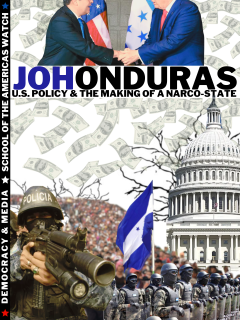
"THE PEOPLE'S INDICTMENT OF THE U.S. GOVERNMENT IN THE MAKING OF A NARCO-STATE IN POST-2009 COUP HONDURAS"
Over a period of twelve years (2010-2022), the United States Government collaborated with a politically corrupt drug trafficking regime in Honduras to create an environment conducive to North American business and military interests. This raises critical questions about the delicate balance between economic objectives and democratic principles in U.S. foreign policy toward Latin America.
In the federal court case U.S.A. v. Juan Orlando Hernández (JOH), the U.S. Government exercised its jurisdiction to administer justice against the former President of Honduras and a U.S. ally. On March 8, 2024, JOH was found guilty of international drug trafficking and weapons charges.There is, however, a glaring omission as the U.S. fails to acknowledge its longstanding political, military, and financial support for JOH. A closer examination of U.S. foreign policy and actions reveals a troubling yet historical pattern of U.S. Government influence, involvement, intervention, and impunity in Honduras.
This "People’s Indictment," exclusively under the jurisdiction of public opinion, charges the U.S. Government with undermining Honduran democracy and aiding JOH's antidemocratic rule, which transformed Honduras into a narco-state under JOH. By aligning with the JOH administration and providing military support, the U.S. Government strategically positioned itself to benefit from the 2009 military coup in Honduras.
On March 6, 2024, U.S. Prosecutor Jacob Gutwillig stood before the court to deliver his closing arguments in the landmark federal case against JOH. Gutwillig's words were pointed and damning: "The defendant was the President of Honduras but in the end, he’s just a drug dealer who sent massive amounts of cocaine to this country. Hold him accountable, find him guilty."This trial marks a significant moment, with the U.S. Government bringing its former ally to justice. However, a critical piece of this complex narrative remains largely unaddressed — the U.S. Government's own role in JOH's rise to power, including the provision of funding, weapons, and training to militarized security forces that committed atrocities against Hondurans protesting the erosion of their democracy and civil liberties.
The story extends beyond the sensationalized headlines of narcopolitics, corruption, and the downfall of an ex-head of state to illuminate the U.S. Government's significant and sustained involvement in the grave injustices committed against the Honduran people and their democracy. By aligning with the post-2009 coup government, the U.S. not only undermined Honduran democracy but also played a part in depriving Hondurans of their rights to democratic processes and sovereignty. This collaboration paved the way for the exploitation of Honduran labor and resources, catering to the long-term economic interests of North American businesses. This chapter in the saga reveals a troubling paradox in U.S. foreign policy — a quest for justice that conveniently overlooks its own complicity in fostering a regime that compromised the very democratic values it purports to uphold.
Anne Milgram, Drug Enforcement Administration (DEA) Administrator: "The DEA’s multi-year investigation revealed that Juan Orlando Hernández, the former President of Honduras, was a central figure in one of the largest and most violent cocaine trafficking conspiracies in the world. Hernández used drug trafficking proceeds to finance his political ascent and, once elected President, leveraged the Government of Honduras’ law enforcement, military, and financial resources to further his drug trafficking scheme."
Read the full article: JOHonduras (shorthandstories.com)
